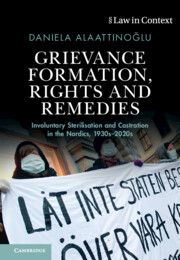 Grievance Formation, Rights and Remedies
Grievance Formation, Rights and Remedies Book contents
- Grievance Formation, Rights and Remedies
- Law in Context
- International Journal of Law in Context: A Global Forum for Interdisciplinary Legal Studies
- Grievance Formation, Rights and Remedies
- Copyright page
- Dedication
- Contents
- Tables
- Foreword
- Acknowledgements
- Abbreviations
- Prologue: Eugenics and the Control of Reproduction and Sexuality
- Part I Developing Rights and Wrongs
- Part II A Question of Rights?
- 2 A Master Frame of Rights
- 3 Sweden: Remedies with Limited Legal Recognition of Responsibility
- 4 Norway: ‘Ethnic Cleansing’?
- 5 Finland: Silence
- Part III Rights Framing and Grievance Formation
- Bibliography
- Index
3 - Sweden: Remedies with Limited Legal Recognition of Responsibility
from Part II - A Question of Rights?
Published online by Cambridge University Press: 18 August 2023
- Grievance Formation, Rights and Remedies
- Law in Context
- International Journal of Law in Context: A Global Forum for Interdisciplinary Legal Studies
- Grievance Formation, Rights and Remedies
- Copyright page
- Dedication
- Contents
- Tables
- Foreword
- Acknowledgements
- Abbreviations
- Prologue: Eugenics and the Control of Reproduction and Sexuality
- Part I Developing Rights and Wrongs
- Part II A Question of Rights?
- 2 A Master Frame of Rights
- 3 Sweden: Remedies with Limited Legal Recognition of Responsibility
- 4 Norway: ‘Ethnic Cleansing’?
- 5 Finland: Silence
- Part III Rights Framing and Grievance Formation
- Bibliography
- Index
Summary
This chapter analyses the Swedish sterilisation laws of 1934 and 1941, castration law of 1944 and sterilisation precondition in the gender recognition act of 1972. More specifically, it considers their establishment, abolition and partial remedy. Exploring both written sources and interviews, the chapter uncovers the processes leading to the compensation acts of 1999 and 2018, and how (particularly trans) victims have mobilised for, and accessed, remedies. The chapter discloses an underlying tension between the limited legal admission of responsibility and the remedies established as ex gratia compensation schemes. It compares the unequal remedies given to each different victim group against their diverging degree of mobilisation. In order to understand their dissimilar recognition and redress, the chapter analyses how grievances have formed and been individually, collectively, publicly and/or institutionally recognised for the different groups. In doing so, it illustrates how the victims’ claims have aligned with a master frame of rights and achieved legal and socio-cultural resonance to diverging degrees
Keywords
- Type
- Chapter
- Information
- Grievance Formation, Rights and RemediesInvoluntary Sterilisation and Castration in the Nordics, 1930s–2020s, pp. 69 - 106Publisher: Cambridge University PressPrint publication year: 2023


